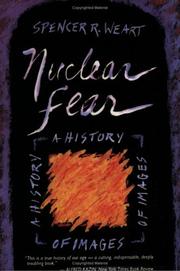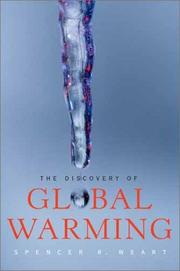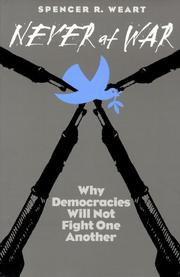| Listing 1 - 10 of 47 | << page >> |
Sort by
|

ISBN: 0674628357 0674628365 9780674628366 9780674628359 Year: 1988 Publisher: Cambridge (Mass.): Harvard university press,
Abstract | Keywords | Export | Availability | Bookmark
 Loading...
Loading...Choose an application
- Reference Manager
- EndNote
- RefWorks (Direct export to RefWorks)
Polemology --- Nuclear energy --- Nuclear warfare --- Antinuclear movement --- Radiation --- History. --- Psychological aspects --- Public opinion --- Nuclear energy - History. --- Nuclear energy - Psychological aspects - History. --- Nuclear warfare - Psychological aspects - History. --- Antinuclear movement - History. --- Radiation - Public opinion - History.
Book
ISBN: 9780674052338 Year: 2012 Publisher: Cambridge, Mass. Harvard University Press
Abstract | Keywords | Export | Availability | Bookmark
 Loading...
Loading...Choose an application
- Reference Manager
- EndNote
- RefWorks (Direct export to RefWorks)
Book
ISBN: 0674795156 Year: 1979 Publisher: Cambridge, Mass. : Harvard University Press,
Abstract | Keywords | Export | Availability | Bookmark
 Loading...
Loading...Choose an application
- Reference Manager
- EndNote
- RefWorks (Direct export to RefWorks)
Science --- Physics --- Nuclear energy --- Sciences --- Physique --- History --- Social aspects --- Histoire --- -Nuclear energy --- -Physics --- -Science --- -Natural science --- Science of science --- Natural philosophy --- Philosophy, Natural --- Physical sciences --- Dynamics --- Atomic energy --- Atomic power --- Energy, Atomic --- Energy, Nuclear --- Nuclear power --- Power, Atomic --- Power, Nuclear --- Force and energy --- Nuclear physics --- Power resources --- Nuclear engineering --- Nuclear facilities --- Nuclear power plants --- -History --- -Social aspects --- Social aspects&delete&

ISBN: 0674011570 9780674011571 Year: 2003 Publisher: Cambridge (Mass.): Harvard university press,
Abstract | Keywords | Export | Availability | Bookmark
 Loading...
Loading...Choose an application
- Reference Manager
- EndNote
- RefWorks (Direct export to RefWorks)
Global warming --- Climatic changes --- Climatology --- Réchauffement de la Terre --- Climat --- History. --- International cooperation. --- Histoire --- Changements --- Réchauffement de la Terre --- Global warming - History. --- Climatic changes - History. --- Climatology - International cooperation.
Book
ISBN: 0674068661 0674065069 9780674065062 9780674052338 0674052331 9780674068667 Year: 2012 Publisher: Cambridge, MA
Abstract | Keywords | Export | Availability | Bookmark
 Loading...
Loading...Choose an application
- Reference Manager
- EndNote
- RefWorks (Direct export to RefWorks)
After a tsunami destroyed the cooling system at Japan's Fukushima Nuclear Power Plant, triggering a meltdown, protesters around the world challenged the use of nuclear power. Germany announced it would close its plants by 2022. Although the ills of fossil fuels are better understood than ever, the threat of climate change has never aroused the same visceral dread or swift action. Spencer Weart dissects this paradox, demonstrating that a powerful web of images surrounding nuclear energy holds us captive, allowing fear, rather than facts, to drive our thinking and public policy.Building on his classic, Nuclear Fear, Weart follows nuclear imagery from its origins in the symbolism of medieval alchemy to its appearance in film and fiction. Long before nuclear fission was discovered, fantasies of the destroyed planet, the transforming ray, and the white city of the future took root in the popular imagination. At the turn of the twentieth century when limited facts about radioactivity became known, they produced a blurred picture upon which scientists and the public projected their hopes and fears. These fears were magnified during the Cold War, when mushroom clouds no longer needed to be imagined; they appeared on the evening news. Weart examines nuclear anxiety in sources as diverse as Alain Resnais's film Hiroshima Mon Amour, Cormac McCarthy's novel The Road, and the television show The Simpsons.Recognizing how much we remain in thrall to these setpieces of the imagination, Weart hopes, will help us resist manipulation from both sides of the nuclear debate.
Antinuclear movement --- Nuclear energy --- Radiation --- Physics --- Radiology --- Atomic energy --- Atomic power --- Energy, Atomic --- Energy, Nuclear --- Nuclear power --- Power, Atomic --- Power, Nuclear --- Force and energy --- Nuclear physics --- Power resources --- Nuclear engineering --- Nuclear facilities --- Nuclear power plants --- Anti-nuclear movement --- Antinuclear protest movement --- Nuclear freeze movement --- Protest movement, Antinuclear --- Social movements --- Nuclear disarmament --- History. --- Psychological aspects. --- Public opinion
Book
ISBN: 0674417550 9780674417557 067403189X 9780674031890 9780674031890 067403189X 0674268296 Year: 2008 Publisher: Cambridge, Massachusetts : Harvard University Press,
Abstract | Keywords | Export | Availability | Bookmark
 Loading...
Loading...Choose an application
- Reference Manager
- EndNote
- RefWorks (Direct export to RefWorks)
In 2001 an international panel of climate scientists announced that the world was warming at a rate without precedent during at least the last two millennia. The story of how scientists reached that conclusion was the story Weart told in The Discovery of Global Warming. The award-winning book is now revised and expanded to reflect the latest science. The award-winning book is now revised and expanded. In 2001 an international panel of distinguished climate scientists announced that the world was warming at a rate without precedent during at least the last two millennia, and that warming was caused by the buildup of greenhouse gases from human activity. The story of how scientists reached that conclusion-by way of unexpected twists and turns-was the story Spencer Weart told in The Discovery of Global Warming. Now he brings his award-winning account up to date, revised throughout to reflect the latest science and with a new conclusion that shows how the scientific consensus caught fire among the general world public, and how a new understanding of the human meaning of climate change spurred individuals and governments to action. "Charting the evolution and confirmation of the theory [of global warming], Weart dissects the interwoven threads of research and reveals the political and societal subtexts that colored scientists' views and the public reception their work received." -Andrew C. Revkin, New York Times Book Review
Global warming --- Climatic changes --- Climatology --- Climate --- Climate science --- Climate sciences --- Science of climate --- Atmospheric science --- Changes, Climatic --- Changes in climate --- Climate change --- Climate change science --- Climate changes --- Climate variations --- Climatic change --- Climatic fluctuations --- Climatic variations --- Global climate changes --- Global climatic changes --- Climate change mitigation --- Teleconnections (Climatology) --- Warming, Global --- Global temperature changes --- Greenhouse effect, Atmospheric --- History. --- International cooperation. --- Environmental aspects --- Global environmental change --- Global warming - History. --- Climatic changes - History. --- Climatology - International cooperation. --- klimaatverandering
Book
ISBN: 2213006393 9782213006390 Year: 1980 Publisher: Paris: Fayard,
Abstract | Keywords | Export | Availability | Bookmark
 Loading...
Loading...Choose an application
- Reference Manager
- EndNote
- RefWorks (Direct export to RefWorks)

ISBN: 9780300082982 0300082983 9780300082982 0300082983 Year: 2010 Publisher: New Haven: Yale university press,
Abstract | Keywords | Export | Availability | Bookmark
Book
Abstract | Keywords | Export | Availability | Bookmark
 Loading...
Loading...Choose an application
- Reference Manager
- EndNote
- RefWorks (Direct export to RefWorks)
Book
ISBN: 0946707782 Year: 1994 Publisher: Andover : Intercept,
Abstract | Keywords | Export | Availability | Bookmark
 Loading...
Loading...Choose an application
- Reference Manager
- EndNote
- RefWorks (Direct export to RefWorks)
| Listing 1 - 10 of 47 | << page >> |
Sort by
|

 Search
Search Feedback
Feedback About UniCat
About UniCat  Help
Help News
News